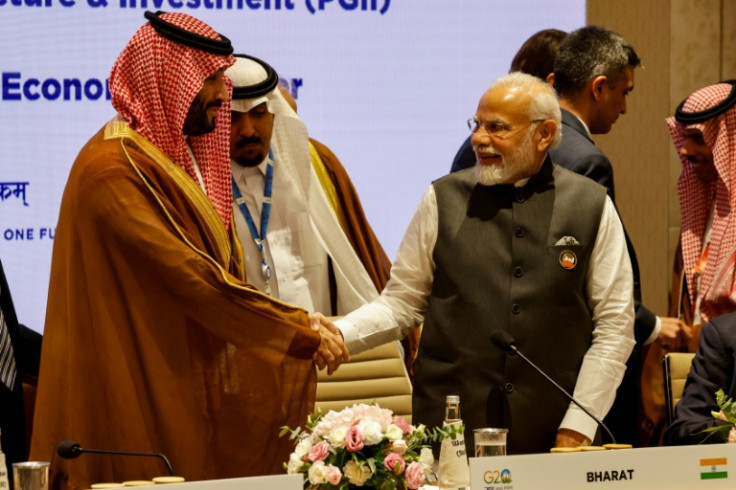India, Saudi Pact Could Change Oil Buyer-Seller Relationship To Energy Transition Partnership

KEY POINTS
- India and Saudi Arabia have signed an MoU to expand their energy alliance
- The pact will see cooperation in renewable energy, energy efficiency, hydrogen, electricity and grid interconnection
- The deal could be a precursor to decarbonizing efforts and help green energy transition
India and Saudi Arabia are expanding their energy alliance with a new pact that could transform their traditional oil buyer-seller relationship and aid the transition to renewable energy.
New Delhi and Riyadh signed a memorandum of understanding to link their power grids, India's Ministry of New and Renewable Energy said in a statement Monday. The pact will also see cooperation in renewable energy, energy efficiency, hydrogen and electricity.
As per the MoU signed by India's Power Minister RK Singh and Saudi Arabia's Minister of Energy Abdulaziz bin Salman bin Abdulaziz AI Saud, both sides also agreed to promote greater cooperation in petroleum, natural gas, strategic petroleum reserves and energy security.
The agreement, which comes as the world is finding ways to accelerate the switch to clean energy, is also aimed at reducing "the effects of climate change, such as carbon capture, utilization and storage."
As the two Asian countries boost their efforts in green energy switch, the new agreement would transform the "traditional oil buyer-seller relationship between India and Saudi Arabia into an energy transition partnership," Manish Vaid, a researcher with an interest in energy policies and geopolitics at Observer Research Foundation (ORF), told International Business Times.
"The interconnection of power grids could significantly boost the reliability of power grids in both countries and foster economic development," Vaid added. "The deal has the potential to change India's status from a net buyer of Saudi oil to an energy exporter with green power and hydrogen exports."
India and Saudi Arabia have maintained friendly relations for decades, and their long history of bilateral trade sees oil as the backbone.
"Saudi Arabia and India's energy relationship is primarily petroleum-based. Saudi Arabia was among India's top three oil exporters over the last two decades. It retained the top spot until 2017 when Iraq became the top crude oil exporter. In 2023, Saudi Arabia was the third largest crude oil exporter to India, as well as the third largest LPG supplier," Lydia Powell, who works on policy issues in energy and climate change with the ORF Centre for Resources Management, told IBT.
The economic cooperation between Saudi Arabia and India "thrives, making Saudi Arabia India's fourth-largest trading partner, with significant investments in both directions," Vaid added.
Indians make up the largest expatriate community in Saudi Arabia and play a "vital role" in the Arab nation's development, he noted.
For decades, India and Saudi Arabia's diplomatic relations have been marked with high-level visits and cultural exchanges. Now, their economic cooperation is also adapting to the times with energy agreements like these that are aimed at helping both countries hit their energy milestones. Saudi Arabia, traditionally known for its vast oil reserves, has also been looking to diversify its trade portfolio and go beyond oil.
The linking of power grids between India and Saudi Arabia could help switch to green energy by helping the nations "reduce their carbon emissions and dependence on fossil fuels by increasing the share of green power in their energy mix," Vaid said. "The offshore link could lower the cost of electricity generation and transmission by utilizing the abundant and cheap renewable energy resources in both countries."
While reducing dependence on dirty energy will not take place overnight, such bilateral agreements are expected to sow the seeds in the transition toward green energy and curb the climate crisis.
"India is likely to remain a net importer of crude oil and LPG in the foreseeable future and Saudi Arabia is likely to remain one of India's trusted petroleum suppliers," Powell added. "In the context of the energy transition, the energy partnership is likely to focus initially on decarbonizing fossil fuels such as carbon capture and storage and hydrogen production. In the longer term, solar and other technologies may cement the partnership."
© Copyright IBTimes 2024. All rights reserved.












